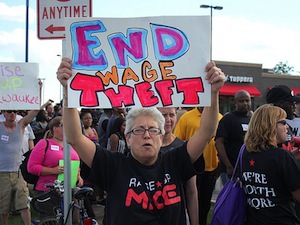Raising Minimum Wage Increases Quality of Life, Not Unemployment
Though many economists would have you that believe raising the minimum wage would result in higher unemployment rates, they are mistaken. Statistical analyses of a significant sampling of studies have shown no evidence that unemployment rates are affected by wage increases.
Though many economists would have you believe that raising the minimum wage would result in higher unemployment rates, they are mistaken. Statistical analyses of a significant sampling of studies have shown no evidence that unemployment rates are affected by wage increases.
As fast food workers protest across America, more than a hundred economists are signing a petition that supports raising the minimum wage. Boosting wages benefits employees and employers alike. Employees are more productive and consume more goods and services when they are financially rewarded, and employers waste less time and money on recruiting and instructing new staffers. During this seemingly endless recession, this kind of stimulation would go a long way.
College student Emily Chong poses the following pertinent question in Salon:
So if we have no evidence linking high wages to job loss, our next question is: are higher wages needed as a poverty reduction tool?
Currently, the 2013 Federal Poverty guidelines stipulate $23,550 for a family of four as poverty level. A $7.25 minimum wage currently nets the protesting fast food workers $15,080 a year if the workers are lucky enough to work 40 hours a week. In a typical household with two parents and two children, parents who make $7.25 earn far below the living wage of $13.55, according to an MIT wage calculator. The numbers become even starker when you separate out true living expenses: food, medical care, housing, transportation, and other needed expenses add up to a required $37,540 annual income before taxes, which is notably different than the poverty guidelines that the U.S. Department of Health & Human Services set. Even if the two parents worked 40 hours a week for 52 weeks, they would only earn $30,160 in total, significantly below the resources they need to live. Moreover, these estimates are only for a typical nuclear family. The struggle that single-income families, large families, or families living in high-cost cities go through is exponentially higher.
The buying power of minimum wage has steadily been waning due to the effects of inflation for the past 40 years. When prices increase, a worker’s paycheck buys less and less.
At McDonald’s, studies have shown that a rise in an average worker’s pay would mean increasing the price of a Big Mac by 5 cents. Isn’t giving Americans a chance at a better quality of life worth a nickel?
—Posted by Natasha Hakimi
Your support matters…Independent journalism is under threat and overshadowed by heavily funded mainstream media.
You can help level the playing field. Become a member.
Your tax-deductible contribution keeps us digging beneath the headlines to give you thought-provoking, investigative reporting and analysis that unearths what's really happening- without compromise.
Give today to support our courageous, independent journalists.






You need to be a supporter to comment.
There are currently no responses to this article.
Be the first to respond.